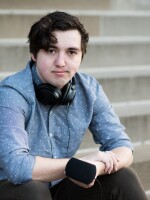The Chico Housing Action Team (CHAT) is hoping to open a tiny home village for unhoused residents in November, after breaking ground on the site last month. Called the Everhart Village, the site is a partnership between CHAT, the Butte County Department of Employment and Social Services, and the Department of Behavioral Health. The plan is to build about 20 homes, with on-site amenities such as a laundry area and kitchens.
NSPR's Alec Stutson recently spoke with CHAT Vice President Robert Trausch about the plans for the site.
This interview has been edited for brevity and clarity.
On the origin of Everhart Village
We started about two years ago with the idea of working with behavioral health on dealing with some of the people in our community who are on the streets, unhoused, who have some mental disabilities and challenges in their life. And we know that when they're on the street, and you're trying to work with them, they lose their medication, they don't have medication, that medication is stolen, they miss their meetings, they end up doing something to get them in the hospital or in the court system. So we talked about how to have a program, which has become innovative, to change that.
Everhart Village was that idea where we will actually build some sleeping cabins, and those sleeping cabins have a fridge, a stove, a bathroom, a bed, a table, everything someone needs to survive. And that dramatically changes the situation in their life, which gives you an opportunity to start working with them. Help them get a license, help them understand the need for medication and help them develop the habit of taking it. We believe in an element where they should be housed and safe and have all the things that a person should have in their life.
"One of the people that I interviewed, they were living under a bridge, literally. She said Bob, all I want is a door to close and lock to lock. That will change my life. So we understand that, and we believe that’s our goal, to have a door to close and a lock to lock for everyone that we can get into a place."— Robert Trausch, vice president of the Chico Housing Action Team (CHAT)
On what opening will look like for Everhart Village
We’ll have the community center up and running and a certain number of the sleeping cabins available for people to be in. We probably won't put all 20 in immediately because this is a learning situation for us, as well as for Behavioral Health, as well as people on the street. So we'll probably start with five to seven of them, and over two or three months we'll expand to 20 as we get a better understanding of what all the services we will have and how many people we'll have working there. So it'll be over a period of time before we're built out.
On the goal for Everhart Village
Our goal has always been to house people because we feel that housing someone changes their life. You can't really have somebody change when they're living on the street, they don't have an address, they don't have clean clothes and have a place to sleep. One of the people that I interviewed, they were living under a bridge, literally. She said Bob, all I want is a door to close and lock to lock. That will change my life. So we understand that, and we believe that's our goal, to have a door to close and a lock to lock for everyone that we can get into a place.
I think part of what CHAT has always done from the very beginning, is we've believed in a few things. One — that we'll talk to anybody. Second — that if you see a problem, talking about the problem doesn't help you find a solution. We've always been solution-based, that's why we have so many programs for vets, for students, for people who are in the last phases of life, for families in crisis, for the people who lost their homes to fire. We have all these programs because we saw a need and we said, How can we fill our little niche? There's so many amazing organizations in this community. We're just an organization that sees that we could take 20 people off the street. So we're doing our little part of making the streets of Chico better for everyone.



